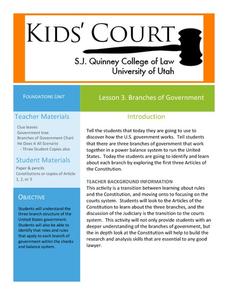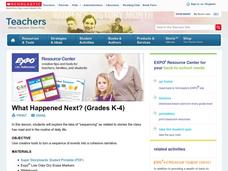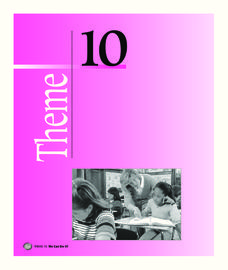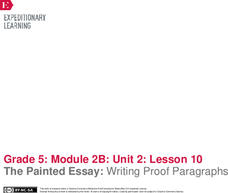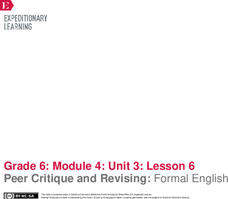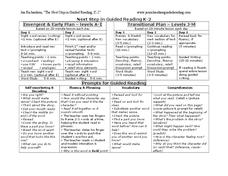EngageNY
Revising the Newspaper Article: Sentence Structure and Transitions
Take two. After a mini lesson covering sentence structure and transition words, scholars revise their End of Unit 3 Assessment based on feedback. Writers self-score their assessments against row three in the Newspaper Article Rubric.
EngageNY
Our Group Readers Theater: Managing the Sequence of Events in Our Script
Go with the flow. Scholars learn how using transition words and phrases helps their scripts flow smoothly. Readers think about connecting each section after determining the sequence for their readers' theater manuscripts from To Kill A...
EngageNY
Revising for Organization: Timely Transitions
During the eighth lesson in a historical fiction unit, pupils practice thoughtfully transitioning their ideas sequentially. After the teacher models how to add these transitions using the Wheelwright draft created in a previous lesson,...
EngageNY
Revising the Informative Consumer Guide: Sentence Structure, Transitions, and Works Cited
Transitions are the glue that link paragraphs together. Pupils listen to a mini lesson plan on sentence structure and transitions and use what they learned to revise their informative consumer guides. Next, they self-assess their writing...
Curated OER
Lesson 3: Branches of Government
Young historians climb through the three branches of the US government in the third lesson of this five-part series. While reading the first three Articles of the Constitution in small groups, children write facts on paper leaves that...
EngageNY
Grade 9 ELA Module 3, Unit 3, Lesson 4
The fourth activity in a unit on crafting a research paper focuses on cohesion within and between paragraphs. Class members examine models that lack cohesion and ones that are cohesive and logically developed before using what they have...
Indiana Department of Education
Social Emotional Learning Competencies PK-12 Lesson Plans
Looking for lesson plans that address social and emotional learning competencies? Here's help in the form of a 166-page packet that includes lesson plans for elementary, middle, and high school learners. Seven detailed plans are provided...
Scholastic
What Happened Next? (Grades K-4)
Explore the structure of narrative writing with this fun, collaborative lesson. Start by reading aloud a short story, asking small groups of learners to fill in key events on a large story board prepared on the class whiteboard....
EngageNY
The Painted Essay for Opinion Writing: Developing a Conclusion and Adding Linking Words
Let's get colorful! Scholars use the Painted Essay technique to analyze and color code the conclusion of a model essay. Working in small groups, pupils then write a conclusion paragraph for their draft editorials about offshore drilling.
EngageNY
End of Unit Assessment: Final Draft of Hero’s Journey Narrative
All journeys must come to an end. Using the final instructional activity in the series, pupils analyze a model narrative for use of transitional words and phrases. Next, they apply their learning to their final drafts of their hero's...
Houghton Mifflin Harcourt
We Can Do It!: English Language Development Lessons (Theme 10)
English language development lessons are brought to you in poems, picture cards, and grand discussions in a We Can Do It! themed unit. Topics of discussion include daily challenges, parts of a whole, words that describe what we hear,...
Walden Woods Project
19th Century Lessons for 21st Century Lives
The words of Henry David Thoreau on Civil Disobedience seem particularly relevant today, as are his writings and those of other transcendental thinkers who ask what it mean to live deliberately and what are the responsibilities of...
EngageNY
Storyboard Revision: Managing the Sequence of Events and Using Sensory Details
Mastering techniques from the resource, pupils give life to their writing, revising their storyboards to include sensory details and transitions. To finish, they participate in a peer critique process and use the feedback to further...
EngageNY
The Painted Essay: Writing Proof Paragraphs
Words of proof. Learners continue coding The Electric Motor by marking the first point in yellow and the second point in blue. They discuss the structure of the paragraphs by identifying transition words and evidence to support the given...
EngageNY
Grade 9 ELA Module 4, Unit 1, Lesson 25
After analyzing the strengths and weaknesses of the evidence they have recorded on their argument outline tool, writers draft their essay's first body paragraphs, ensuring they have properly cited their source material.
EngageNY
Peer Critique and Revising: Formal English
Dear Sir or Madam: What's the difference between formal and informal language? Scholars focus on using formal English and transitions in their position papers. After revising their rough drafts, they engage in the peer editing process...
Ware County Schools
Simple Directions
When teaching someone how to do something, it's important to give clear directions. Your youngsters can practice their skills by completing these worksheets meant to help learners describe the steps in a process. It's not just any...
NASA
The Science of the Sun
There's more to that glowing ball of light in sky than most children realize. From the overall structure of the solar system, to the changing of the seasons, these hands-on lessons open the eyes of young scientists to the important role...
Historical Thinking Matters
Spanish-American War: 1 Day Lesson
After analyzing newspaper articles portraying different perspectives of the explosion of the Battleship USS Maine, your young historians will take a stand on which position is the most believable in both discussion and writing.
Curated OER
The Writer’s Toolbox: What You Need to Master the Craft
All the tools (and directions) you’ll need to build an essay are included in a resource designed for learners and educators. The packet can be given to class members or divided into sections and used as part of a series of lesson on the...
Association of American Geographers
Project GeoSTART
Investigate the fascinating, yet terrifying phenomenon of hurricanes from the safety of your classroom using this earth science unit. Focusing on developing young scientists' spacial thinking skills, these lessons engage learners in...
Channel Islands Film
Dark Water: Lesson Plan 2 - Grade 3
A discussion of bioluminescence launches an investigation of animal adaptations. After re-watching the opening minutes of Dark Water, class members listen to a reading of What Do You Do with a Tail Like This, and then create a new animal...
Northern Lights Special Education Cooperative
Lessons from The 7 Habits of Highly Effective Teens
As part of a study of Sean Covey, the author of The 7 Habits of Highly Effective Teens learners write autobiographical e-mails, hold discussions, create a collage, and compose a personal mission statement. Pupils then have a chance to...
Wisconsin State Reading Association
Next Step in Guided Reading
Here are three guided reading lesson plan templates; each designed to meet the needs of a specific level of readers. Levels in focus are emergent, early, and transitional readers. Additionally, prompts to support your small group...






